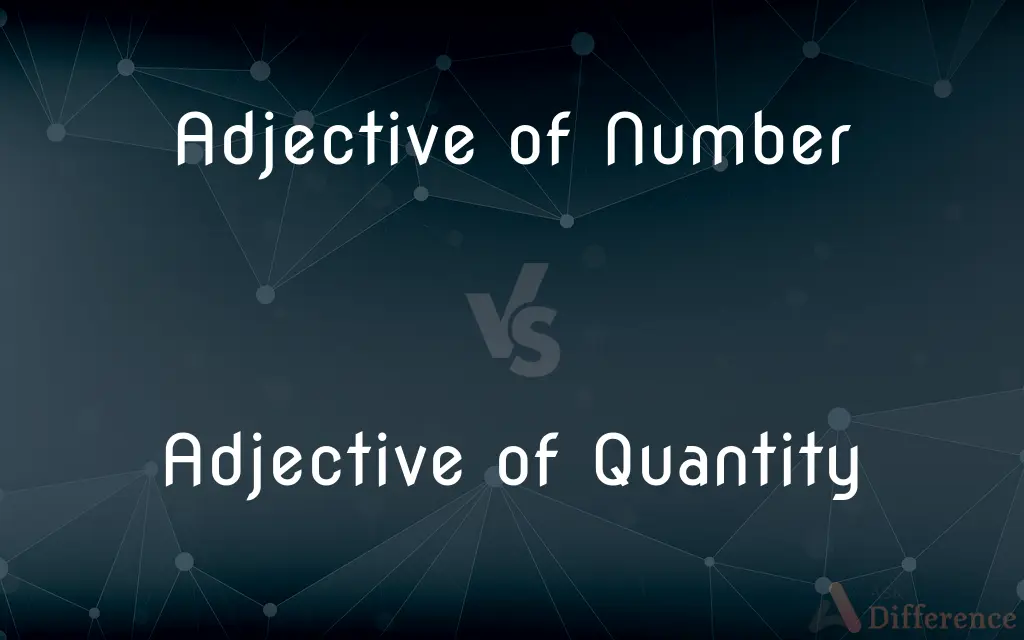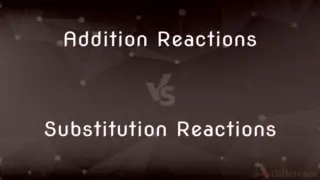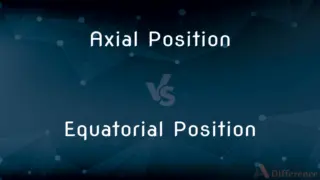Adjective of Number vs. Adjective of Quantity — What's the Difference?
Edited by Tayyaba Rehman — By Fiza Rafique — Published on December 29, 2023
Adjective of Number specifies "how many"; Adjective of Quantity indicates "how much". Both describe amounts, but the former is specific, the latter general.

Difference Between Adjective of Number and Adjective of Quantity
Table of Contents
ADVERTISEMENT
Key Differences
An Adjective of Number tells us about a precise countable number of things or the order of something in a sequence. For instance, "three dogs" or "first prize" makes use of Adjective of Number to convey exact numerical details or position. On the other hand, Adjective of Quantity offers a more general sense of amount, typically used with uncountable nouns. When we say, "some water" or "much effort," we are using Adjective of Quantity to express an unspecified amount.
Adjective of Number and Adjective of Quantity, while closely related, serve different linguistic purposes. Think of Adjective of Number as the definite descriptor, it gives you an exact figure or position. Adjective of Quantity, in contrast, is more indefinite. It provides a vague sense of the amount without pinpointing an exact number.
In practice, when one wishes to be precise about quantities, they'd employ Adjective of Number. For example, "four cars" or "second chapter" clearly denotes exactness. However, if one isn't certain about the amount or it's impractical to count, Adjective of Quantity steps in. Examples like "little time" or "enough food" fall under this category.
Another crucial distinction is the kind of nouns they modify. Adjective of Number typically precedes countable nouns, whereas Adjective of Quantity is usually found with uncountable nouns. Therefore, while "ten books" (using Adjective of Number) is correct, "much books" (using Adjective of Quantity) isn't.
Comparison Chart
Specifies
Exact count or order
Vague or general amount
ADVERTISEMENT
Type of Noun Modified
Countable
Uncountable
Examples
One, two, three, first, second
Some, much, little, enough, a lot of
Precision
Definite
Indefinite
Typical Usage
"I have three apples."
"I need some water."
Compare with Definitions
Adjective of Number
An adjective that signifies the position of something in a sequence.
He finished in third place.
Adjective of Quantity
Describes a general or unspecified quantity.
I drank some water.
Adjective of Number
Relates to the enumeration or ordering of items.
The fourth chapter is the longest.
Adjective of Quantity
Conveys the extent without specifying a number.
He has enough experience.
Adjective of Number
An adjective that expresses a definite number or the order of something.
She won the first prize.
Adjective of Quantity
An adjective indicating an approximate amount or extent.
She has much patience.
Adjective of Number
An adjective that denotes an exact count of items.
There are five pencils on the table.
Adjective of Quantity
Used predominantly with uncountable nouns.
There's a lot of sand at the beach.
Adjective of Number
It provides specific numerical information.
I have two cats at home.
Adjective of Quantity
Indicates an imprecise volume, degree, or magnitude.
There's little hope left.
Common Curiosities
What kind of nouns does Adjective of Quantity modify?
Uncountable nouns.
Can you give an example of an Adjective of Number?
"Three" in "Three apples."
Can you use Adjective of Quantity with countable nouns?
Generally no, but there are exceptions, like "a lot of apples."
Can "first" be considered an Adjective of Number?
Yes, it indicates order in a sequence.
What does an Adjective of Number specify?
It specifies an exact count or the order of something.
What does an Adjective of Quantity indicate?
It indicates a vague or general amount.
What kind of nouns does Adjective of Number typically modify?
Countable nouns.
Is "ten water" correct?
No, because "water" is uncountable, so an Adjective of Quantity like "some" or "much" should be used.
Is "many" an Adjective of Quantity?
No, "many" is an Adjective of Number used with countable nouns.
What's a common mistake regarding Adjective of Quantity?
Using it with countable nouns, like "much people" instead of "many people."
Why is "much books" incorrect?
Because "books" is countable, so an Adjective of Number like "many" should be used.
What's the main difference between Adjective of Number and Adjective of Quantity?
Adjective of Number is definite and specific, while Adjective of Quantity is indefinite and general.
Which adjective type would you use to describe "sugar"?
Adjective of Quantity, as "sugar" is uncountable.
Can "several" be used as an Adjective of Number?
Yes, "several" denotes a specific yet not exact count.
Are "enough" and "a lot of" Adjectives of Quantity?
Yes, they both describe general amounts.
Share Your Discovery

Previous Comparison
Oat Bran vs. Rolled Oats
Next Comparison
Addition Reactions vs. Substitution ReactionsAuthor Spotlight
Written by
Fiza RafiqueFiza Rafique is a skilled content writer at AskDifference.com, where she meticulously refines and enhances written pieces. Drawing from her vast editorial expertise, Fiza ensures clarity, accuracy, and precision in every article. Passionate about language, she continually seeks to elevate the quality of content for readers worldwide.
Edited by
Tayyaba RehmanTayyaba Rehman is a distinguished writer, currently serving as a primary contributor to askdifference.com. As a researcher in semantics and etymology, Tayyaba's passion for the complexity of languages and their distinctions has found a perfect home on the platform. Tayyaba delves into the intricacies of language, distinguishing between commonly confused words and phrases, thereby providing clarity for readers worldwide.















































